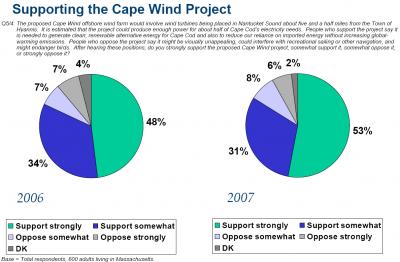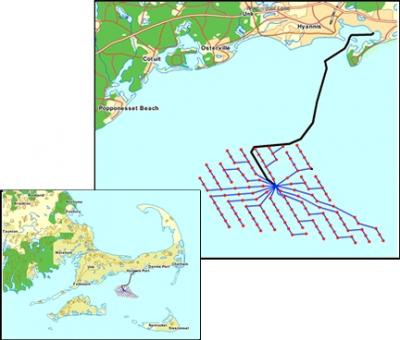In a major new statewide survey, solid majorities of Massachusetts residents – spanning all political parties – and those who live on the Cape and on the Islands — said they want the Bay State to emerge as a national leader in alternative energy, including wind power projects such as Cape Wind. The new Opinion Research Corporation (ORC) poll (pdf) for the Newton-based Civil Society Institute also looks at the attitudes of state residents about coal-fired power plants, nuclear power, and the federal vehicle fuel-efficiency standards that Massachusetts Rep. Ed Markey is now shepherding through Congress.
The scientific survey of 600 state residents found that 93 percent of Massachusetts residents — including 78 percent of those who live on the Cape and on the Islands — agree that the state should be “a national leader in using cleaner and renewable energy on a large scale by moving ahead with offshore wind power” and other clean energy initiatives. The statement is supported on a bipartisan basis by Republicans (94 percent), Democrats (93 percent), and Independents (93 percent).
More than four out of five Massachusetts residents (84 percent) — including 58 percent of those who live on the Cape and on the Islands — explicitly support “the proposed Cape Wind offshore wind farm that would involve wind turbines being placed in Nantucket Sound about five and a half miles from the Town of Hyannis.” These numbers are virtually unchanged from a June 2006 Civil Society Institute (CSI) survey that posed the same question and found 81 percent support statewide and 61 percent in Cape Cod/the Islands (the latter of which is within the survey’s margin of error). Republican support for Cape Wind is at 82 percent, Democrats at 86 percent and Independents at 81 percent.
Another key finding: Almost nine out of 10 Massachusetts residents (88 percent) think that Massachusetts Gov. Deval Patrick should follow the lead of California Gov. Arnold Schwarzenegger “when it comes to state government leadership on global warming solutions and the promotion of clean, renewable energy.” About two out of three state residents (65 percent) expressed strong support for such an approach and only 9 percent said no. Support for this leadership role being taken by Governor Patrick was strongly supported across the political spectrum: Republicans (82 percent); Democrats (93 percent); and Independents (80 percent).

So there you have it. Wide spread support from all political parties for renewable energy leadership including but not limited too support for cape wind. So why are people like Ted Kennedy still opposing this project? Their views are far from reflecting the opinion of Mass. residents, in fact it is rapidly becoming an embarrassing political liability. Could it be that Kennedy, Delahunt oppose the project because it could harm the view from their large summer homes? We must assume that something is up. Ted Kennedy has been around the block way to many times in this state to not realize that this is going to hurt him.
Civil Society Institute President and Founder Pam Solo said:
“I would encourage Governor Patrick, Senator Kennedy, Senator Kerry, Representative Markey and the rest of the Massachusetts congressional delegation to look closely at these survey findings. The notion that wind power and the other clean energy sources are dividing lines in Massachusetts either in terms of politics or region … or both … is an entirely mistaken and counterproductive idea. Instead, what we see in this survey is a clear example of Massachusetts citizens ‘leading the leaders.’ State residents want action now on clean, safe renewable energy sources, including Cape Wind, and also higher federal fuel-efficiency standards for vehicles. They want the state to get out in front as a true national leader solving the threats posed by global warming and our addiction to foreign oil.”
With the specter of global warming set to affect Massachusetts particularly hard I think that our political leaders have a unique chance to do something major and important right in our back yard we should take it. It would also be a way to spark a new and vibrant economic power house in the state.
“Opinion Research Corporation Senior Researcher Graham Hueber said: “One of the most striking aspects of this survey is the clear sense that state residents have of a potential ‘Massachusetts Miracle’ if their leaders decide to take a front-and-center role on clean energy solutions to global warming. It is very telling that a very strong 91 percent of state residents see a parallel to the Route 128 tech boom of the 1980s and now want the state to emulate California ‘in seeking to create new jobs and industries by becoming a national hub for new energy technology development.”
Commenting on the survey, Barbara Hill, executive director, Clean Power Now, Hyannis, MA., said: “This past spring Governor Patrick and his administration took an historic step forward by determining the Cape Wind Project’s Final Environmental Impact Report (FEIR) as adequate, moving us closer to realizing significant public benefits such as improved air quality, energy reliability and economic growth. The development of this project as proposed will advance the Commonwealth’s energy policy goals and help make Massachusetts a world leader in the development and production of clean energy.”
KEY SURVEY FINDINGS
- More than nine out of 10 state residents (91 percent) agreed with the following statement: “In the 1980s, Massachusetts’ Route 128 was famous as the rival to California’s Silicon Valley when it came to incubating new high-tech companies and emerging computer technologies. More than 20 years later, California is taking the lead with renewable energy. Should Massachusetts follow California in seeking to create new jobs and industries by becoming a national hub for new energy technology development?” There is strong bipartisan support for such leadership among Republicans (90 percent), Democrats (92 percent) and Independents (90 percent).
- More than four out of five constituents (84 percent) of Rep. Ed Markey say “yes” when asked: “Massachusetts Congressman Ed Markey will be a leader in the U.S. House of Representatives about what Congress decides to do on global warming in his role as chair of the special U.S. House committee on global warming. Do you think Congressman Markey should use his role to push for Congress to enact a higher 40 miles per gallon standard by 2010 in order to reduce dependence on Middle East oil and also cut global-warming pollution?” Over half (55 percent) said “definitely” yes and only 13 percent said “no.” (Rep. Markey is currently proposing lower federal fuel-efficiency standards that would take considerably longer to go into effect than the 40-MPG-by-2010 standard outlined in the survey.)
- Over three out of four state residents (78 percent) — and 61 percent of those living on the Cape and on the Islands — support wind as the best energy resource for provide electricity to Cape Cod and the Islands. Statewide, the support for other alternatives was as follows: nuclear (10 percent); coal (4 percent); and other (5 percent). Wind power is supported by 74 percent of Republicans, 81 percent of Democrats and 78 percent of Independents. These support levels are up slightly from 2006: 74 percent statewide and 57 percent for the Cape/Islands.
- Clean renewable energy is widely supported over nuclear power in Massachusetts, including on the Cape and on the Islands. State residents would prefer to see solar (91 percent), more conservation (90 percent), and wind power (89 percent) used first before resorting to more nuclear power. On the Cape and on the Islands, the views were very similar, with strong support for wind power (75 percent); conservation (81 percent); and solar (84 percent).
- More than three out four Massachusetts residents (78 percent) favor a “five-year moratorium on new coal-fired power plants on the East Coast and the rest of the United States if there was stepped-up investment on clean, safe renewable energy – such as wind and solar – and improved home energy-efficiency standards.” This statement was supported strongly by 50 percent of state residents and opposed by only 19 percent. 76 percent of Republicans, 83 percent of Democrats and 67 percent of Independents support the notion of a moratorium on more coal-fired power plants.
- A nearly unanimous 94 percent of state residents support efforts in Massachusetts such as that undertaken by Cambridge, which “has announced that it will be the first energy-efficient city in the U.S.” Nearly three out of four state residents (73 percent) strongly support such steps and only 3 percent oppose them. Interestingly, likely 2008 voters are somewhat more supportive of such an approach in the state than are non-voters (95 percent v. 89 percent).
- More than four out of five state residents (83 percent) agree that “President Bush and Congress should increase the federal fuel-efficiency standard NOW to 40 miles per gallon,” rather than waiting to achieve a lower MPG standard over a longer period of time. Over half of state residents (56 percent) feel strongly about the need for quick action versus a total of 14 percent who oppose it. Quick action on federal fuel efficiency standards is supported across the political spectrum: Republicans (80 percent); Democrats (84 percent); and Independents (82 percent). When framed in this way, the shift to a higher MPG standard on a quick basis is supported by 84 percent of the constituents of Congressman Ed Markey.
- More than three out of four state residents (84 percent) think that a “significant portion” of the gasoline tax funding the Federal Highway Trust Fund should be used “to accelerate research and development into alternative fuel and energy sources that could reduce dependence on Middle East oil and also cut global-warming pollution.” More than three out five state residents (63 percent) said that the federal gasoline tax should “definitely” be used for such purposes versus 15 percent who said “no.” The earmarked gas tax concept is particularly popular with 18-24 year olds at 90 percent. The approach also is supported by 77 percent of Republicans, 90 percent of Democrats and 73 percent of Independents.
- Nearly nine out of 10 state residents (87 percent) “favor enhanced home energy-efficiency standards in Massachusetts and the rest of the United States in order to decrease heating and cooling energy consumption and related bills for consumers.” Nearly three out of five state residents (59 percent) expressed strong support for such an approach.
- Three out of four state residents said they are “aware of the public discussion about Cape Wind, the offshore wind farm proposed for Nantucket Sound.” About one quarter (24 percent) said they had no awareness. Among the Cape/Islands portion of the respondents, 93 percent are aware of Cape Wind versus 7 percent who are not.
- The political party identification of the Massachusetts survey respondents breaks down as follows: Republican (12 percent); Independent/lean Republican (11 percent); Independent (17 percent); Independent/lean Democratic (25 percent); and Democratic (31 percent).
- 92 percent of state residents said that they are likely to vote in 2008.
So now we find ourselves in a situation where the vast majority of state residents of all parties seem to overwhelmingly want the leaders of this state to pursue renewable energy. They want solar power, they want cape wind, and they want efficiency, and most of them plan on voting. We can only hope they remember the answering to the survey when they are in the voting booth. The real question is how will the leaders opposing cape wind explain why they have the opinion they do? Could it be the view? Could it be they don’t want to have to sail their yachts around the turbines? The political tide is not turning, it has turned, and if the leaders of this state don’t realize this, they are at risk of being swept away.


Jeez, how far behind does the USA have to get on offshore wind before someone realises that Europe has completely captured the market (and all the technology) in large scale wind.
A number of massive offshore wind farms have already been approved for UK waters (see http://www.bwea.com/ukwed/consented.asp) and the detailed analyses are taking place as I write. Has Cape Wind gaine any approval yet? It is looking more and more like a white elephant that is keeping people talking while the coal industry secretly plots a resurgence.
Please read below: (It comes from the CSI website too)
METHODOLOGY
Survey results are based on telephone interviews conducted among a sample of 600 adults aged 18 and over living in private households in the Massachusetts. Interviewing was completed by Opinion Research Corporation during the period of July 25-August 2, 2007. Completed interviews of the survey adults were weighted by two variables: age and gender, to ensure reliable and accurate representation of the total adult population, including a subset of residents of the Cape/Islands. About nine out of 10 respondents (89 percent) said that they live in Massachusetts somewhere other than the Cape and on the Islands versus 10 percent who said that they do live on the Cape/Islands. The margin of error is plus or minus 4 percentage points for the complete sample of 600 adults. Smaller sub-groups will have larger error margins.”
So 1 in 10 people surveyed in live on Cape Cod…out of the 600 sampled…this means that CSI based results for the entire Cape and Islands on feedback from 60 people…
I’m sorry to tell you that a poll of 600 people does not carry much statistical significance, much less 60!
I cannot take any of the things you say seriously – all of your assumptions are based on poor statistical analysis.
So, Klaus, what is the opinion of the Cape residents? What is your opinion?
Feel free to criticise the methodology objectively, but as you have an opinion (clearly) about the project then I’d love to hear it.
Keith
N.B. 600 is significant if random and properly stratified. Why does the opinion of only the residents count? The project is for all, not just those who have an aesthetic (subjective) opinion.
Keithf… I think it all comes down to the fact that the farther away people live from a proposed industrial project the less they are inclined to investigate the negative impacts on their neighbor’s community and natural resources and the more inclined they are to accept the marketing of that project. After all, they have nothing to lose and ‘possibly’ something to gain, as in promises. However the delivery of those promises are no skin off their noses, really. It is the local people who have the real interest and investigate exactly what is to gain for the sacrifice and potential environmental harm. Case in point… many people of Buzzards Bay supported Cape Wind before Jay Cashman proposed a wind project for that community… and then suddenly, that project was heavily investigated as to benefit and harm. And then it was dropped. As were the projects off the coast of Long Island and Texas. In the end it was economics that killed them. Of course, Cape Wind refuses to reveal the economics of their project… Not surprising since that would reveal the cost to rate-payers… which would not only affect Cape Cod residents it would affect those living in other areas who might not be so positive in their support, given the real figures on a project that appears to be ‘green’ but will not put even one fossil fuel plant out of business. And in fact would cause more to be built.
Dona, some very thoughtful and worthwhile comments.
I would like you to read this article, and see if it changes your mind at all.
http://earth-blog.bravejournal.com/entry/15546
Thanks.
Keith
Ha, ha, ha, ha, ha.ha….! Note that The Hastings Group serves as CSI’s strategic partner in communication strategy. Communication strategy? like in PR flaks! Don’t tell me that “poll” was some kind of scientific survey without a hidden agenda. Cape Wind proponents will leave no stone unturned to trash Nantucket Sound with their proposed industrial operation the size of Manhattan.
And speaking of questionable tactics, why won’t Cape Wind reveal how much power from their operation will cost the public? Why won’t they own up to the fact that the vast majority of Cape Wind opponents aren’t wealthy landowners? Lies, lies, and more lies. What a disgrace. Greenpeace should hide its collective face in shame: shilling for corporados who want to privatize The Commons AND trash Nantucket Sound!